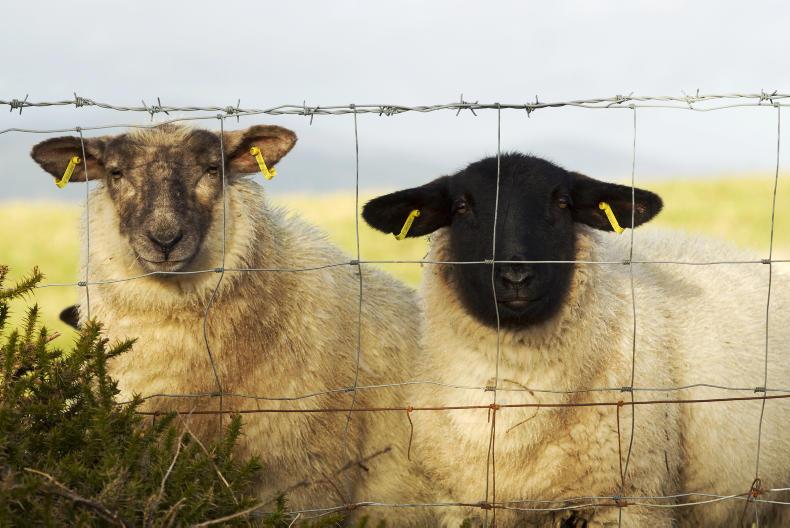The clean sheep policy has caused major issues in the last few weeks, the IFA livestock director Kevin Kinsella, told a sheep farmer meeting in Ballylickey, west Cork, this week.
Current Department of Agriculture regulations stipulate that sheep killed in factories have to reach a certain level of cleanliness, but bad weather and the lack of a standardised approach in different factories, means a clipping charge is being added to slaughtered sheep, which cuts into farmers’ margins.
Kinsella pointed out that the absence of a local factory in the Munster region, increased the potential for clipping on arrival to a factory due to increased journey times.
“It is EU regulation that if lambs leave a trailer in a factory they have to be killed in that factory,” Kinsella stated.
He was adamant that those with clean sheep shouldn’t have to pay for the clipping of sheep not meeting the standard, and told attendees that there were similar issues when a clean cattle policy was brought in.
Farmers at the meeting also felt that there was a serious situation ahead with the closing day for controlled burning approaching and no sign of an extension.
With almost eight months of rainfall in the area, ground in the region is saturated and farmers are currently unable to burn within the permitted window.
Financial viability
The newly elected IFA hill farming committee chair, Flor McCarthy, was also in attendance.
“The lack of financial viability is a big reason why young people are not returning to farm in hill areas,” McCarthy said.
“Younger farmers have less time to spend on the hills because they have to get an off-farm job. Because of this, we need to include quads, meal bins and specialised sheep trailers in TAMS.
“Returns will have to come from supports if there is no market returns,” he added.
Farmers were also concerned by the poor prices received for hill lambs and Kevin Kinsella pointed out that farmers may have to rely on Irish market demand, given that the Muslim festivals that have been boosting lamb trade in recent years, are set to start before the main lamb crop is ready in the future.
Sheep welfare scheme
The IFA livestock director reminded farmers that they could apply to enter the sheep welfare scheme until 9 February.
Kinsella highlighted the need to get more farmers into the scheme, and pointed out that, to date, fewer farmers had applied than had received payment for taking part in the scheme last year.
Farmers attending the meeting felt this was due to a number of reasons including that people didn’t realise they had to reapply every year.
Others in the crowd ascertained that farmers hadn’t bothered applying because they felt €10/ewe wasn’t a generous enough return for being part of the scheme if you had a smaller flock.
Read more
Sheep management: clean livestock policy
Sheep prices: demand driving price recovery
The clean sheep policy has caused major issues in the last few weeks, the IFA livestock director Kevin Kinsella, told a sheep farmer meeting in Ballylickey, west Cork, this week.
Current Department of Agriculture regulations stipulate that sheep killed in factories have to reach a certain level of cleanliness, but bad weather and the lack of a standardised approach in different factories, means a clipping charge is being added to slaughtered sheep, which cuts into farmers’ margins.
Kinsella pointed out that the absence of a local factory in the Munster region, increased the potential for clipping on arrival to a factory due to increased journey times.
“It is EU regulation that if lambs leave a trailer in a factory they have to be killed in that factory,” Kinsella stated.
He was adamant that those with clean sheep shouldn’t have to pay for the clipping of sheep not meeting the standard, and told attendees that there were similar issues when a clean cattle policy was brought in.
Farmers at the meeting also felt that there was a serious situation ahead with the closing day for controlled burning approaching and no sign of an extension.
With almost eight months of rainfall in the area, ground in the region is saturated and farmers are currently unable to burn within the permitted window.
Financial viability
The newly elected IFA hill farming committee chair, Flor McCarthy, was also in attendance.
“The lack of financial viability is a big reason why young people are not returning to farm in hill areas,” McCarthy said.
“Younger farmers have less time to spend on the hills because they have to get an off-farm job. Because of this, we need to include quads, meal bins and specialised sheep trailers in TAMS.
“Returns will have to come from supports if there is no market returns,” he added.
Farmers were also concerned by the poor prices received for hill lambs and Kevin Kinsella pointed out that farmers may have to rely on Irish market demand, given that the Muslim festivals that have been boosting lamb trade in recent years, are set to start before the main lamb crop is ready in the future.
Sheep welfare scheme
The IFA livestock director reminded farmers that they could apply to enter the sheep welfare scheme until 9 February.
Kinsella highlighted the need to get more farmers into the scheme, and pointed out that, to date, fewer farmers had applied than had received payment for taking part in the scheme last year.
Farmers attending the meeting felt this was due to a number of reasons including that people didn’t realise they had to reapply every year.
Others in the crowd ascertained that farmers hadn’t bothered applying because they felt €10/ewe wasn’t a generous enough return for being part of the scheme if you had a smaller flock.
Read more
Sheep management: clean livestock policy
Sheep prices: demand driving price recovery






 This is a subscriber-only article
This is a subscriber-only article










SHARING OPTIONS: